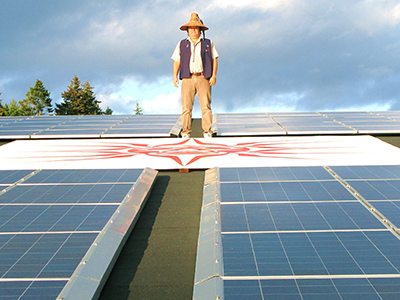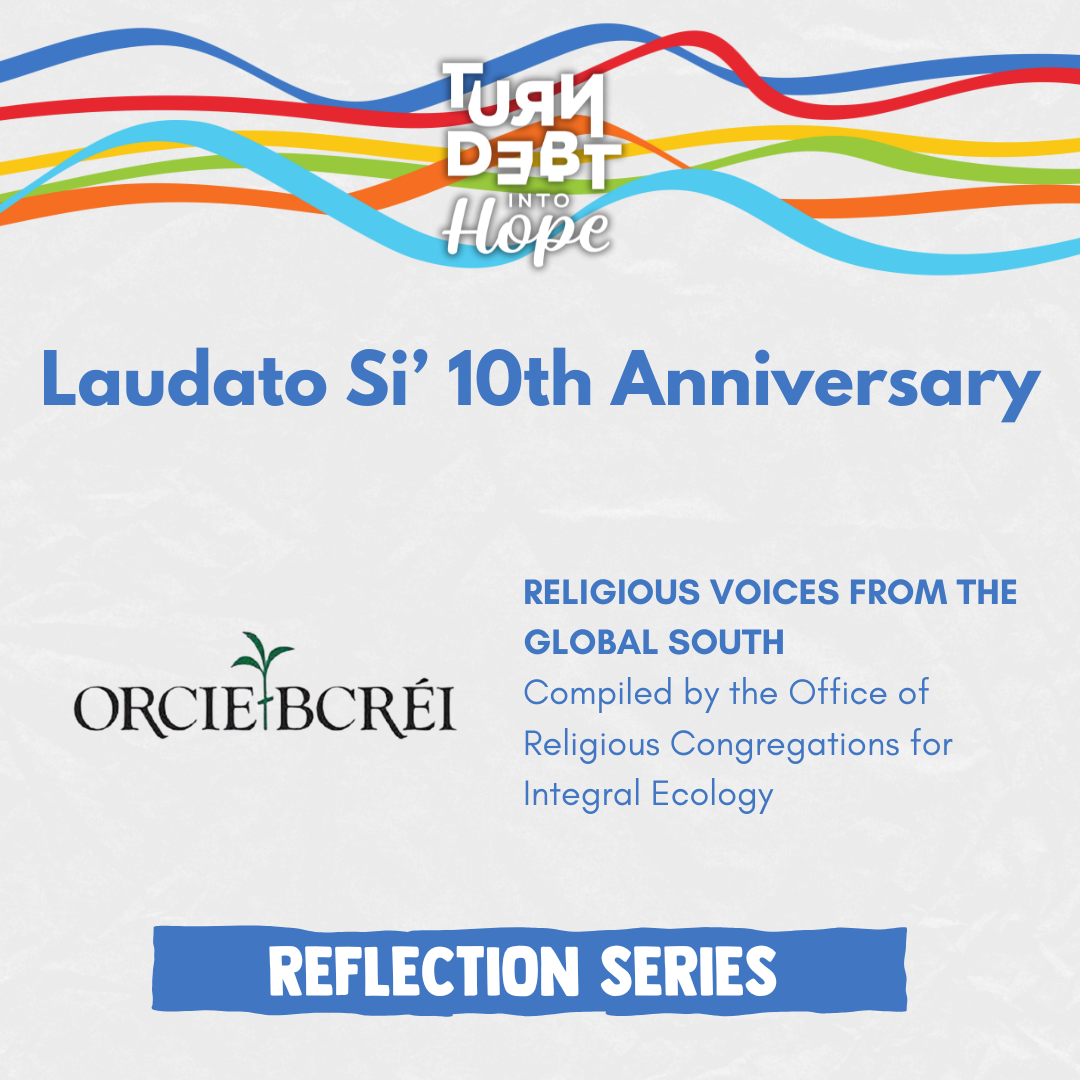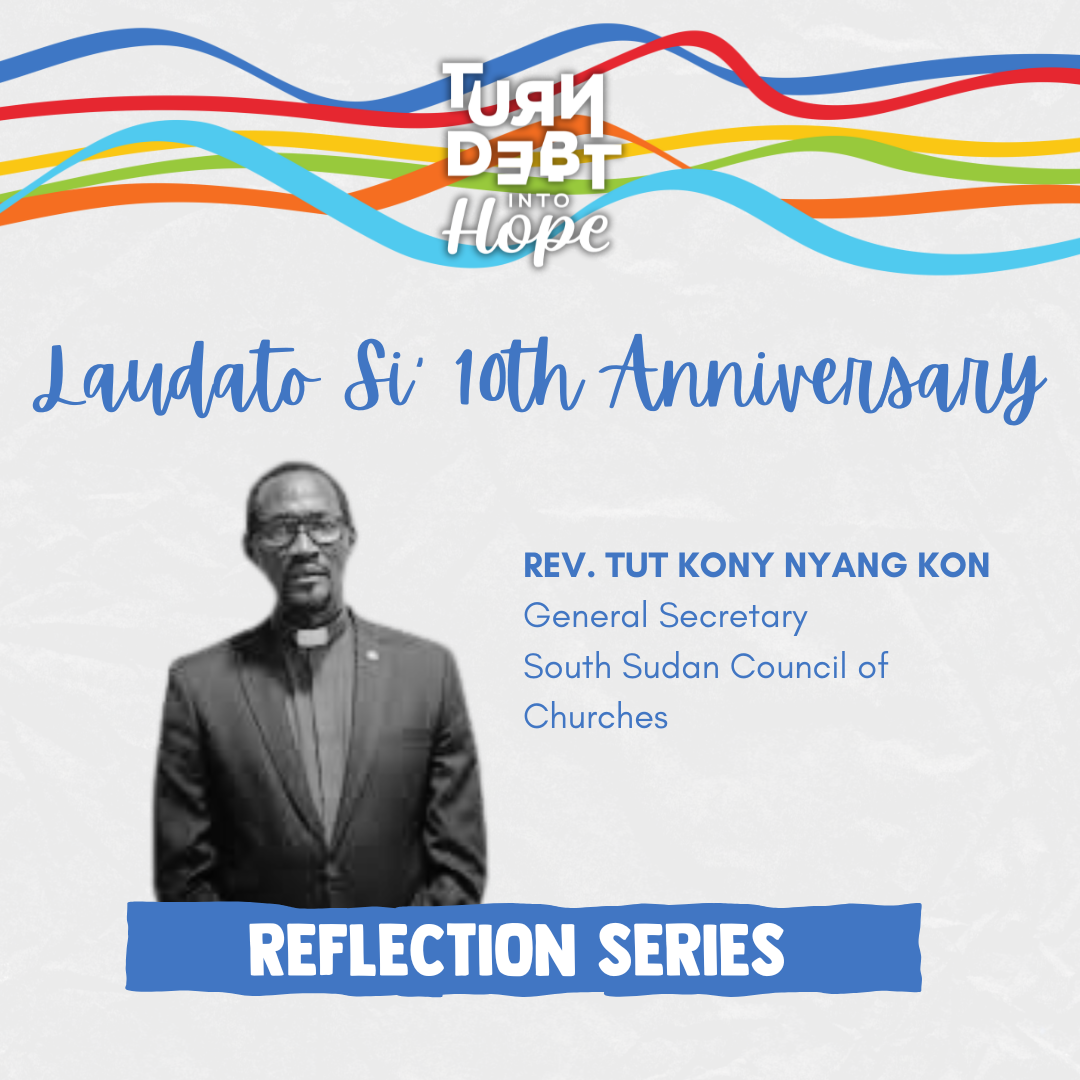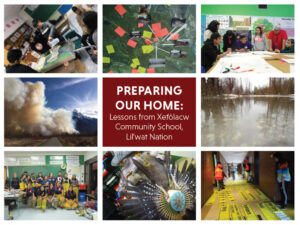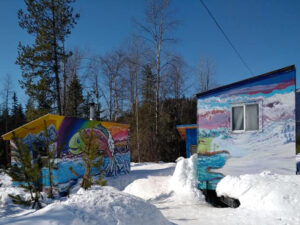Trailblazer: T’Sou-ke First Nation Solar and Greenhouse Initiatives
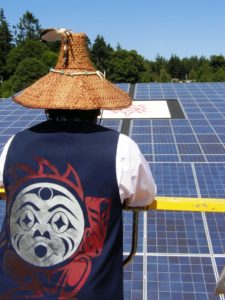
“In order to achieve sustainability, it needed to embrace traditional values, including deep respect for Mother Earth.” – Chief Planes
In an effort to build a stronger, more sustainable economy the T’Sou-ke First Nation is “setting the table for future generations” with their sustainable energy and food initiatives. This is how Chief Gordon Planes describes how the community is transitioning to renewable energy. T’Sou-ke First Nation, located in the Sooke Basin of Vancouver Island, began its journey of becoming a sustainable solar community in 2008, when the community developed a Comprehensive Community Planning (CCP) process based on the Seven Generations Teaching. The Seven Generations Teaching is part of the Law of the Iroquois, and involves the principle that each decision a community makes should benefit future members approximately 100 years into the future. By following traditional values, such as only taking what they need from the land, members of the community maintain a respectful relationship with the land. As Chief Planes explains, “the whole territory used to be used in a way that was sustainable. We only took what we needed and we need to get back to that.” For Indigenous communities, looking to teachings from ancestors is essential to build a link between knowledge held in the past and the future. What emerged from CCP process was a vision for the community with 4 key goals: energy autonomy, food self-sufficiency, cultural renaissance, and economic development.
The objective of energy autonomy led to solar projects in the community that were twice as large as any other in BC at the time, and involved the installation of solar photovoltaic systems and solar hot water systems that were completed in 2009. The Nation’s work was assisted by a $400,000 award from the BC Government ICE Innovative Clean Energy Fund. For the solar hot water systems, ten members of the community received training for the installation and worked with contractors to install systems in half the houses in the community, as well as the community kitchen.
Community interest and involvement in energy conservation initiatives increased when members realized that the cost of saving energy is one-tenth of the cost of producing energy (T’Sou-ke First Nation, 2013). This zero-emission solar initiative substantially reduces electrical consumption and supplies power when hydro systems are down. All T’Sou-ke First Nation administration buildings are Net Zero. In the summer, the community sells surplus solar electricity to BC Hydro, and in the winter buys it back to reach zero consumption (and costs) over the whole year. Hydro bills have plummeted for community members. By providing clean and sustainable energy to the community and training and employment opportunities, this initiative upholds the Seven Generations Teaching.
In addition to energy autonomy, the T’Sou-ke First Nation developed sustainable farming systems towards its goal of food self-sufficiency. In 2012, the Nation received $250,000 from the Nuu-chah-nulth Economic Development Committee (NEDC) to build a commercial greenhouse. The community’s garden initiatives have encouraged children and youth to get involved through learning programs and member gardens. For the T’Sou-ke First Nation providing a space where children and youth can learn about clean energy and sustainable food programs is very important. These greenhouse and garden initiatives, according to Christine George, provide a space to teach respect for our lands, and how we harvest it (George, 2017). T’Sou-ke First Nation, working in partnership with a Chinese company, currently operates an 80 hectare Oyster Farm in the Sooke Basin producing 4 Million Oysters a year.
T’Sou-ke First Nation has been a leader in demonstrating how a community can embrace renewable energy with positive outcomes for the local economy. Every year, over 2,000 visitors from all over the world travel to the T’Sou-ke Centre for Sustainability for tours and workshops. Their work is part of a greater momentum of First Nations communities who are leading the way to a just transition. According to a 2017 Lumos Energy study, medium to large renewable energy projects with Indigenous involvement in Canada have increased from 20 to 152 since 2008. The same study reported an additional 1,200 smaller projects built with Indigenous participation to generate electricity for local communities. The experience and expertise of communities such as T’Sou-ke First Nation that have implemented renewable energy initiatives, will strengthen Canada’s broader just transition to clean energy. Indigenous teachings as well as the lessons learned from their experience offer a unique perspective to other communities. As Chief Planes says, “The Creator provided resources for us to take care of ourselves… all of us can prosper together.”
Written by: Randy Schmucker and Beth Lorimer
Works Cited:
- George, C. (2017). T’Sou-ke First Nation’s Ladybug Garden & Greenhouse. Retrieved from http://concretegarden.ca/content/land-writes/tsou-ke-ladybug-garden/
- Lumos Clean Energy Advisors. (2017). Powering Reconciliation – A Survey of Indigenous Participation in Canada’s Growing Clean Energy Economy. Retrieved from https://mma.prnewswire.com/media/571359/Lumos_Energy_Powering_Reconciliation___Survey_of_Indigenous_part.pdf
- Sun keeps shining on T’Sou-ke. (2013). Retrieved from http://www.tsoukenation.com/sun-keeps-shining-on-tsou-ke/
- Tammemagi, Hans. (2013, Nov). Old Ways, New Path. Alternatives Journal, 39.6. Retrieved from: http://www.alternativesjournal.ca/people-and-profiles/old-ways-new-path
- Williams, Matt. (n.d.), “The T’Sou-Ke First Nation Solar Power Initiative”. Retrieved from https://www.herox.com/crowdsourcing-news/264-the-tsou-ke-first-nation-solar-power-initiative
